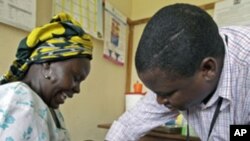Health ministers from four African countries – Ethiopia, Mali, Senegal, and Sierra Leone – are in Washington to push for greater ownership of their national health care programs.
They are expected to issue a “Call to Action” to help make country ownership of health programs a reality.
Dr. Medhin Zewdu, director-general of the Office of the Ethiopian Ministry of Health, says ownership brings about greater commitment to the country’s health programs.
“As you know, countries are struggling to provide the best health services to their people and, you know, we have as the Millennium Development Goals to reduce maternal mortality and also the fight against [HIV/AIDS] epidemic. So, we are calling for action because we need to move faster when it comes to ownership to ensure sustainability,” she says.
The four African countries are members of the Ministerial Leadership Initiative for Global Health which is leading the push for country-led development in health.
“The Ministerial Leadership Initiative is basically to support countries to have ownership of their own programs, of their priorities, of their needs, as I said, to save the lives of mothers and [the] lives of babies, and to provide, overall health services as a basis of human rights and dignity,” Zewdu says.
Zewdu said, without country ownership of their health programs, those programs will have no sustainability.
“In the old times, [development] partners used to come with their funds, with probably their own program agendas and the countries are just there to implement what they are told to do. And, in Ethiopia, we are saying that we have our own identified priorities and we want our partners to help us in achieving those targets and results,” she says.
At the Global Health Conference, being held this week in Washington, a panel discussion is expected to focus on whether donors would still support health programs when they are led by countries.
Zewdu says the days of one leads and the others will follow are over. Now, she says it’s time for partnership.
“Actually, I wouldn’t really want to use the words “countries lead and the others follow” because, in the past, it was donors lead and countries follow. So, instead of one leading and the others follow, I think we need to really talk of a real partnership and be mutually accountable; we can achieve the results in more effective way,” she says.
Zewdu said many donors today, including (those in) the United States, are moving toward supporting more country ownership of their health programs.
“If I take the U.S. Global Health Initiative, the GHI, its main principle is to promote country ownership. So, countries know what they need and you know our U.S. partners and all other partners elsewhere are now trying to understand us and also approve that this is the only way,” she says.
She said, if donors want to help African countries realize the Millennium Development Goals in health, they must promote country ownership.
Zewdu admitted that not everyone is on board (with) the idea of country ownership of health programs. But, she says it is a process that is slowly gaining traction.




